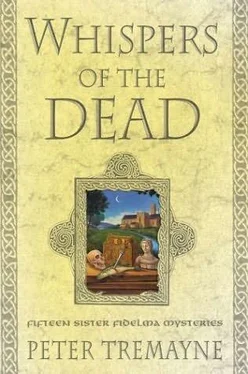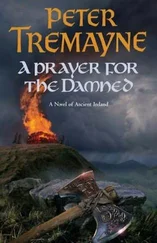Peter Tremayne - Whispers of the Dead
Здесь есть возможность читать онлайн «Peter Tremayne - Whispers of the Dead» весь текст электронной книги совершенно бесплатно (целиком полную версию без сокращений). В некоторых случаях можно слушать аудио, скачать через торрент в формате fb2 и присутствует краткое содержание. Жанр: Исторический детектив, на английском языке. Описание произведения, (предисловие) а так же отзывы посетителей доступны на портале библиотеки ЛибКат.
- Название:Whispers of the Dead
- Автор:
- Жанр:
- Год:неизвестен
- ISBN:нет данных
- Рейтинг книги:4 / 5. Голосов: 1
-
Избранное:Добавить в избранное
- Отзывы:
-
Ваша оценка:
- 80
- 1
- 2
- 3
- 4
- 5
Whispers of the Dead: краткое содержание, описание и аннотация
Предлагаем к чтению аннотацию, описание, краткое содержание или предисловие (зависит от того, что написал сам автор книги «Whispers of the Dead»). Если вы не нашли необходимую информацию о книге — напишите в комментариях, мы постараемся отыскать её.
Whispers of the Dead — читать онлайн бесплатно полную книгу (весь текст) целиком
Ниже представлен текст книги, разбитый по страницам. Система сохранения места последней прочитанной страницы, позволяет с удобством читать онлайн бесплатно книгу «Whispers of the Dead», без необходимости каждый раз заново искать на чём Вы остановились. Поставьте закладку, и сможете в любой момент перейти на страницу, на которой закончили чтение.
Интервал:
Закладка:
“So, from what you say, only little Maine welcomed Enda and in him did the child find any sense of companionship?” queried Spélan.
“That is so. But Dublemna was a vindictive and cruel foster mother as well as mother.”
“So you think it was she who actually killed Enda in some rage against the boy?” the old judged was frowning.
Fidelma shook her head.
“Enda left his game of hide and go seek that morning and walked back to the homestead. At the pond he was hit over the head by someone wielding a stone and then pushed into the pond. Maine found him and then ran to fetch help. .”
“But who did it?”
“Dublemna’s influence was strongest on her daughters. Both of them took their cue of hatred for Enda from her. I suspect they were both hated by their mother and sought to please her. One of them, in fact, went out of her way to please the mother. That was Faife.”
“But why?” Spélan was astonished. “Why would this child resort to murder?”
“The logic of a child is not the same as that of an adult. I think that Faife, overhearing her mother’s anger at her husband for having brought the child into fosterage with them, and her dislike of the child, thought it would please her mother if the child was punished-especially when her father refused to punish the boy.”
“It is strange thinking but I have heard similar tales of children trying to appease parents by doing things they think will please them.”
“In fact, I believe that Faife even decided to provide some ammunition for her mother to justify her dislike. She was the one taking the honey. She stole the eggs and planted them under the bed and then came to accuse Enda.”
“But what happened at the pond?”
“I believe that when they were playing hide and go seek, Faife decided-having overheard the conversation between her mother and father-to physically hurt Enda as her mother wanted. Enda had left the game. The next game began-we heard from Maine that it took a long time to find Faife. In the time she was supposed to be hiding-when Maine and Una were trying to find her-she went after Enda, found a stone, and hit him on the back of the head. We may never know if her intention was to kill him. When she discovered he was dead she pushed his body in the pond. That’s how she muddied and soaked her dress. She tried to disguise it by pretending she was hiding under a bush. But the bush grew in stony, dry ground. It would not have been soaked or muddied, merely dirtied.”
Brehon Spélan whistled softly.
“But we cannot prove that Faife killed the boy. You are Brehon enough to know that your reconstruction would not stand up as proof in court.”
Fidelma sighed deeply.
“I know. That is the sad thing. There is no redress in law for Fécho unless he is persuaded to change his claim back to death by neglect. They have a good chance of being compensated by Colla paying half the dire, or honor price. Enda was over the age of seven, so after that age, the child’s honor price becomes half that of his father. Under law we can do no more. I can also fine Dublemna for hitting her own children as an infraction of the law but I don’t think I will make her see that her hatred of Enda, indeed, her dislike even of her own children, led to this tragedy. Colla and Dublemna will stop up their ears. The next recommendation is, that due to the fines, they be refused any position as fosterers in the future.”
Brehon Spélan shook his head sadly.
“This is one of those times when justice and law are not the same thing, Fidelma. I am sure that we will be able to get Fécho to accept that he press for the lesser charge. I agree about Colla and Dublemna. But what about Faife? What is to stop her the next time she feels like using violence as a solution? I know that you are fond of quoting Publilius Syrus, Fidelma. Didn’t he say that the judge is condemned when the guilty one goes free?”
“He did. But then we are here to interpret and maintain the law, for whenever the rule of law ends rule by tyranny begins. At least we have our great féis every three years at which we can argue, with others, and attempt to change the laws that are wrong and expand those that need such amendment. But here and now it is not the law which is wrong but lack of evidence.”
“Perhaps sometimes circumstantial evidence should be taken into judgment when it is very strong. . such as when you find an overturned and empty pail of milk and a cat sleeping beside it. It is clearly the cat that is guilty.”
Fidelma smiled mischievously.
“Yet a good lawyer might argue that perhaps a dog happened by, overturned the pail, emptied the milk, which evaporated and afterwards a cat came along and merely went to sleep beside it. Who can with certainty say that the cat was the guilty party?”
THE LOST EAGLE
This is Deacon Platonius Lepidus, Sister Fidelma. He is a visitor from Rome and he wishes a word with you.”
Fidelma looked up in surprise as the stranger was shown into the scriptorium of the abbey. She was a stranger in the abbey herself-the abbey of Augustine. Augustine was the former prior of St. Andrews in Rome, who had died here scarcely sixty years ago having been sent as missionary to the king of the Cantware. It was now the focal point of the Jutish Christian community in the center of the burg of Cantware. Fidelma was waiting for Brother Eadulf to finish some business with the Archbishop Theodore. The religieux who had announced the Deacon’s presence had withdrawn from the library, shutting the door behind him. As Fidelma rose uncertainly the Deacon came forward to the table where she had been seated.
Platonius Lepidus looked every inch of what she knew to be a Roman aristocrat; there was arrogance about him in spite of his religious robes. She had been on a pilgrimage to Rome and knew that his aristocratic rank would immediately be recognizable there. He was tall, with dark hair and swarthy of complexion. His greeting and smile were pleasant enough.
“The Venerable Gelasius told me that you had rendered him a singular service when you were in Rome, Sister. When I heard that you were here in Cantwareburg, I felt compelled to make your acquaintance.”
“How is the Venerable Gelasius?” she rejoined at once, for she had warm memories of the harassed official in the Lateran Palace where the Bishop of Rome resided.
“He is well and would have sent his personal felicitations had he known that I would be meeting with you. The scriptor has informed me that you are on a visit with Brother Eadulf, whom the Venerable Gelasius also remembers fondly. I was also informed that you are both soon to leave for a place called Seaxmund’s Ham.”
“You are correctly informed, Deacon Lepidus,” Fidelma replied with gravity.
“Let us sit awhile and talk, Sister Fidelma,” the Deacon said, applying action to the word and inviting her to do the same with a gesture of his hand. “I am afraid that I also have a selfish interest in making your acquaintance. I need your help.”
Fidelma seated herself with an expression of curiosity.
“I will help if it is a matter that is within my power, Deacon Lepidus.”
“Do you know much about the history of this land?”
“Of the kingdom of the Jutes? Only a little. I know that the Jutes drove out the original inhabitants of Kent scarcely two centuries ago.”
The deacon shook his head swiftly.
“I meant knowledge of this land before the Jutes came here. Before they drove the Britons out. The time when it was called Britannia and a province of Rome. You know that in the days of the great Roman Empire our legions occupied and governed this land for several centuries?”
Fidelma bowed her head in amused affirmation at the slight tone of pride in his voice.
Читать дальшеИнтервал:
Закладка:
Похожие книги на «Whispers of the Dead»
Представляем Вашему вниманию похожие книги на «Whispers of the Dead» списком для выбора. Мы отобрали схожую по названию и смыслу литературу в надежде предоставить читателям больше вариантов отыскать новые, интересные, ещё непрочитанные произведения.
Обсуждение, отзывы о книге «Whispers of the Dead» и просто собственные мнения читателей. Оставьте ваши комментарии, напишите, что Вы думаете о произведении, его смысле или главных героях. Укажите что конкретно понравилось, а что нет, и почему Вы так считаете.












